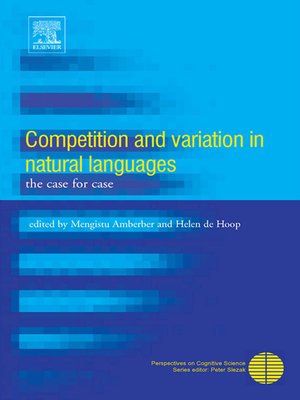Competition and Variation in Natural Languages
ebook ∣ The Case for Case · Perspectives on Cognitive Science
By Mengistu Amberber

Sign up to save your library
With an OverDrive account, you can save your favorite libraries for at-a-glance information about availability. Find out more about OverDrive accounts.
Find this title in Libby, the library reading app by OverDrive.



Search for a digital library with this title
Title found at these libraries:
| Library Name | Distance |
|---|---|
| Loading... |
This volume combines different perspectives on case-marking: (1) typological and descriptive approaches of various types and instances of case-marking in the languages of the world as well as comparison with languages that express similar types of relations without morphological case-marking; (2) formal analyses in different theoretical frameworks of the syntactic, semantic, and morphological properties of case-marking; (3) a historical approach of case-marking; (4) a psycholinguistic approach of case-marking. Although there are a number of publications on case related issues, there is no volume such as the present one, which exclusively looks at case marking, competition and variation from a cross-linguistic perspective and within the context of different contemporary theoretical approaches to the study of language. In addition to chapters with broad conceptual orientation, the volume offers detailed empirical studies of case in a number of diverse languages including: Amharic, Basque, Dutch, Hindi, Japanese, Kuuk Thaayorre, Malagasy and Yurakaré.The volume will be of interest to researchers and advanced students in the cognitive sciences, general linguistics, typology, historical linguistics, formal linguistics, and psycholinguistics. The book will interest scholars working within the context of formal syntactic and semantic theories as it provides insight into the properties of case from a cross-linguistic perspective. The book also will be of interest to cognitive scientists interested in the relationship between meaning and grammar, in particular, and the human mind's capacity in the mapping of meaning onto grammar, in general.







